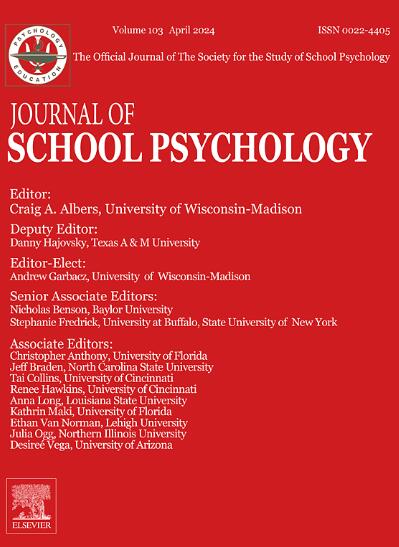片断增长混合模型的贝叶斯方法:学校心理学中的问题与应用
IF 4.1
1区 心理学
Q1 PSYCHOLOGY, SOCIAL
引用次数: 0
摘要
贝叶斯片断增长混合模型(PGMMs)是一种基于贝叶斯框架的强大统计工具,用于模拟异质亚群随时间变化的非线性、阶段性发展轨迹。尽管贝叶斯增长成长模型(Bayesian PGMMs)有利于学校心理学研究,但其在该领域的实证应用仍然有限。本文介绍了贝叶斯 PGMM,阐述了三个关键的方法论注意事项(即类分离、类枚举和先验敏感性),并为其实施提供了实用指导。通过分析 "幼儿纵向研究-幼儿园队列 "的数据集,我们说明了如何应用贝叶斯 PGMM 建立跨潜在班级的数学成绩片断增长轨迹模型。我们强调了在分析程序中做出决策时同时考虑统计标准和实质性理论的重要性。此外,我们还讨论了透明报告结果的重要性,并为该领域的研究人员提供了注意事项,以促进贝叶斯 PGMMs 的广泛应用。本文章由计算机程序翻译,如有差异,请以英文原文为准。
Bayesian approach to piecewise growth mixture modeling: Issues and applications in school psychology
Bayesian piecewise growth mixture models (PGMMs) are a powerful statistical tool based on the Bayesian framework for modeling nonlinear, phasic developmental trajectories of heterogeneous subpopulations over time. Although Bayesian PGMMs can benefit school psychology research, their empirical applications within the field remain limited. This article introduces Bayesian PGMMs, addresses three key methodological considerations (i.e., class separation, class enumeration, and prior sensitivity), and provides practical guidance for their implementation. By analyzing a dataset from the Early Childhood Longitudinal Study-Kindergarten Cohort, we illustrate the application of Bayesian PGMMs to model piecewise growth trajectories of mathematics achievement across latent classes. We underscore the importance of considering both statistical criteria and substantive theories when making decisions in analytic procedures. Additionally, we discuss the importance of transparent reporting of the results and provide caveats for researchers in the field to promote the wide usage of Bayesian PGMMs.
求助全文
通过发布文献求助,成功后即可免费获取论文全文。
去求助
来源期刊

Journal of School Psychology
PSYCHOLOGY, EDUCATIONAL-
CiteScore
6.70
自引率
8.00%
发文量
71
期刊介绍:
The Journal of School Psychology publishes original empirical articles and critical reviews of the literature on research and practices relevant to psychological and behavioral processes in school settings. JSP presents research on intervention mechanisms and approaches; schooling effects on the development of social, cognitive, mental-health, and achievement-related outcomes; assessment; and consultation. Submissions from a variety of disciplines are encouraged. All manuscripts are read by the Editor and one or more editorial consultants with the intent of providing appropriate and constructive written reviews.
 求助内容:
求助内容: 应助结果提醒方式:
应助结果提醒方式:


